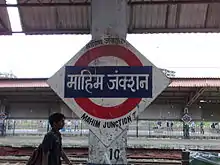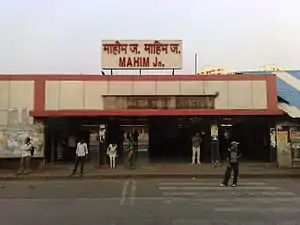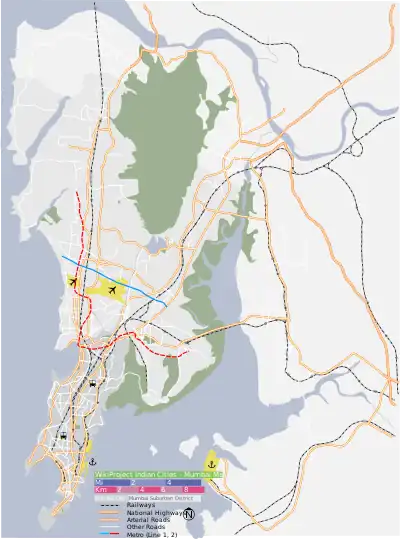Mahim Junction railway station
Mahim Junction ([maːɦiːm]; station code: MM) is a railway station on the Western line and Harbour Line of the Mumbai Suburban Railway network.[1] It serves the last town of the Mumbai city : Mahim.
History
The original Mahim station belonged to the GIP Railway (today's Central Railway), and the company began services to the station all the way back in 1853, when it started India's first passenger train service from Bori Bunder (in Bombay) to Tannah (now, Thane). The original station was located near the Mandvi (Custom House) near where the Mahim Causeway starts.[2]There were two routes: one from Bori Bunder to Tannah, and the other from Bori Bunder to Mahim. The Mahim route diverged from the main line only near Sion,[3] with the only intermediate station being Byculla, as referring to a timetable published in a Bombay Times (today's Times of India) report published on 8th April 1853. It took 40 mins to travel each way by the service. It was speculated in a report, that the railways would transform Mahim from a simple fishing village, to a port of importance.
During times of water crisis, the GIPR would run water trains. In fact a separate water committee was formed. Soon, a joint venture was proposed by the committee in 1855 with GIP Railway. This would help create a wooden reservoir at Mahim station. Water would be drawn from tanks at Mahim, and poured in this reservoir. It could hold enough water to fill one train, with each train carrying an average of 10,000 gallons (37854.12 L). 24 water trains ran between Bombay and other localities in the time frame between 2 and 9 June 1854 to bring in water to the city. Of this, 21 had run to and fro from Mahim.
The Mahim station of GIPR was lost with time, and a Mahim station was built later by the BB&CI Railway (today's Western Railway) which arrived in the city a decade later. The first station building was completed in 1869.[4] Much later, the Mahim-Wadala Link to the Bombay Port Trust Railway was opened on 11 August 1914.
After this, tracks between Mahim and Bandra station were quadrupled, opening to freight traffic in May 1917, and to passenger traffic in October 1920. In March 1922, in an effort to relieve local tracks between Mahim and Dadar station, the intermediate tracks too were quadrupled. Further, to suffice the demand for better local service, tracks between Parel North Cabin and Mahim were quadrupled temporarily, opening for passenger traffic in May 1922. With all this, the humble two platform Mahim station, consisting of just two up-down main lines, and another branching line beside the Island platform, turned into a large station with four lines, and even goods sidings.[5]

References
- "Mahim Railway Station Map/Atlas WR/Western Zone - Railway Enquiry". indiarailinfo.com.
- Aklekar, Rajendra B. (2014). Halt Station India : The Dramatic Tale of the Nation's First Rail Lines. Rupa Publications. p. 163. ISBN 978-81-291-3497-4.
- see pg. 7 https://swr.indianrailways.gov.in/uploads/files/1597914101378-The%20first%20%20running%20of%20%20railway%20locomotive%20%20in%20India.pdf
- Rahul Mehrotra, Sharada Dwivedi (2000). Anchoring A City Line. Eminence Designs Pvt. Ltd. p. 36. ISBN 81-900602-4-4.
- An article dated December 1923, detailing the BB&CI Local service. See pg. 12,13,14. See pg. 14 for diagram https://wr.indianrailways.gov.in/cris/uploads/files/1392817679390-article1.pdf

